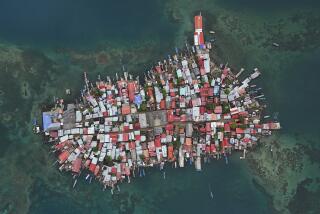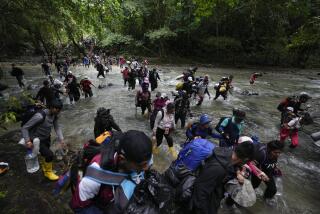Panama Economic Crunch Tightens : Government Workers May Not Get Paid; Protest Dissipates
PANAMA CITY â New indications of the severe economic crisis in Panama surfaced Friday while a planned demonstration against military strongman Manuel A. Noriega disintegrated at the sight of riot troops in the streets.
One Panamanian newspaper reported that the government planned to âdeferâ payroll checks for government workers because of a lack of cash. Several bureaucrats told The Times that they have been notified their next paycheck, due Tuesday, will be only partial.
In addition, owners of private grocery and pharmacy chains asserted that they have been threatened with expropriation if they refuse to accept government paychecks as payment for purchases.
The economic crunch is the result of pressure initiated by the Reagan Administration to oust Noriega, who was indicted last month by two U.S. grand juries for drug trafficking and related crimes.
Cash Freeze
The United States has frozen cash held by the Panamanian government in American banks, forcing the National Bank of Panama, the countryâs central bank, to suspend operations and private banks to close their doors.
Friday, the Administration announced additional measures to further reduce the Panamanian governmentâs income, among them the placing in escrow of payments due this country for ships passing through the Panama Canal.
No one knows precisely how much cash the Panamanian government has on hand, but there is evidently not enough to meet the next government payroll. The government pays salaries every two weeks, and the size of the payroll due Tuesday is estimated at $30 million.
The newspaper La Estrella reported that the government will come up short. âThe payments will have to be deferred . . . because of the overall need for cash,â the newspaper quoted Finance Minister Hector Alexander as saying.
There was no word when salaries would be paid, how they would be paid, nor how much.
Fractional Payments
Public employees in two ministries told The Times that perhaps half of their salaries would be withheld. âWe are only going to be paid fractionally,â a worker in the Commerce Ministry said.
A secretary in the Justice Ministry said: âWe can probably accept one missed payday. People have been prepared for something like this. But another one and there will be trouble.â
It is not clear that the cash shortage has been felt in the military, Noriegaâs main pillar of support. U.S. officials have said that economic sanctions against Panama are in part meant to dry up funds to pay the 15,000 members of Panamaâs Defense Forces.
Payday for the soldiers was Thursday, and some troops said they have been paid as usual, by check, which they cashed at a special military bank. Others said they had not been paid at all.
âIf we were not paid, we would take to the streets,â said a military officer at Panama Cityâs port.
âWe were paid, no problem. Noriega is not going to leave just because the U.S. tells him to,â said Capt. Antonio Lopez, who was on riot patrol in Panama Cityâs financial district.
âSacrifices Requiredâ
But a young corporal nearby said he had not been paid and was told that âsacrifices would be required.â
According to owners of seven major chain stores, the government is trying to lean on them to accept government paychecks. âIf we do not,â a statement from the owners said, âthe government will intervene and expropriate our businesses.â
The store owners said they would close within 24 hours and lay off all their workers if they were forced to accept the checks.
The statement asserted that Commerce Minister Mario Rognani tried to persuade them to accept the checks. Owners reached by phone declined to discuss the issue.
Rognani denied that he had threatened the owners. âWe were just trying to find a solution to the cash problem,â he said.
However, he hinted that the government might go into the grocery business itself. âWe are, after all, the biggest purchaser of foodstuffs,â he said.
No Sign of Leaving
Despite the evident economic problems, there were no overt signs that Noriega was preparing to leave office. A rumor surfaced that asylum was being prepared for him in Spain, but it could not be confirmed.
Meanwhile, expected public protests against Noriega barely materialized. Business-led opponents of Noriega had called for street demonstrations Friday. But the few demonstrators who showed up quickly disappeared when soldiers wearing helmets and carrying shields took up positions at major intersections. The ensuing protests were limited to the burning of trash and tires on side streets in and near the cityâs high-rise financial neighborhood.
âThere were too many troops on the street,â said Jorge de la Guardia, a member of Panamaâs Chamber of Commerce. The chamber is part of the self-styled Civic Crusade, which has spearheaded opposition to Noriega for the past 8 1/2 months.
At some protest sites, more reporters were present than demonstrators. Irritated soldiers at one point tossed tear-gas canisters at photographers and sprayed at least two journalists with pepper gas, a powerful eye and skin irritant.
More to Read
Sign up for Essential California
The most important California stories and recommendations in your inbox every morning.
You may occasionally receive promotional content from the Los Angeles Times.










